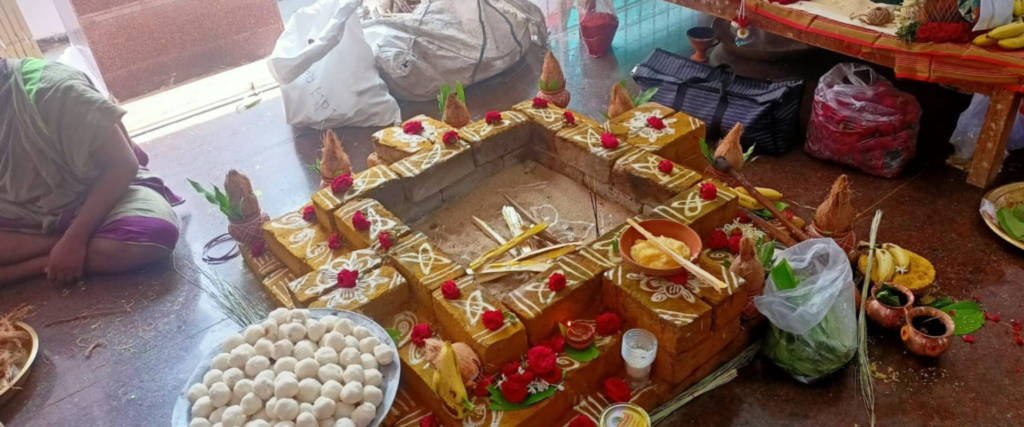Pandit vs Purohit: What’s the Difference and Whom Should You Book Near You?
In India, spirituality and rituals form the soul of every celebration — from naming ceremonies to weddings and Griha Pravesh. But when it’s time to book someone to perform the rituals, many people find themselves puzzled: Should I call a Pandit or a Purohit?
While both are experts in Hindu rituals and Vedic traditions, their roles, expertise, and regional identities differ slightly. Understanding these differences helps you choose the right person for your specific puja or ceremony — ensuring your event is conducted with precision and devotion.
In this guide, we’ll simplify the Pandit vs Purohit comparison, explain their responsibilities, and help you decide whom to book near you.
Who is a Purohit?
A Purohit is also a Hindu priest who performs rituals, but the term is more commonly used in South India. The word “Purohit” means “one who stands in front” — symbolizing a person who leads devotees during sacred rituals.
Roles and Responsibilities of a Purohit:
Conducting Vedic rituals, homams, and samskaras.
Leading temple ceremonies and family functions.
Maintaining ancestral or community-based rituals.
Assisting families in Shraddha karma and Pitru puja.
A Purohit’s duties often go beyond household ceremonies — many also serve as temple priests or family priests for generations.

Who is a Pandit?
A Pandit is a learned Hindu scholar or priest, well-versed in Sanskrit, Vedas, and the Shastras. The term “Pandit” originates from the Sanskrit word “Pandita,” meaning a person of profound knowledge.
Roles and Responsibilities of a Pandit:
Performing Hindu rituals and ceremonies such as Puja, Havan, and Sanskaras.
Offering astrological consultations and horoscope readings.
Conducting spiritual discourses and Vedic chanting.
Guiding families in daily puja practices and customs.
Pandits are often associated with North Indian traditions, where the term is more commonly used. For example, you might book a Pandit for:
Pandit vs Purohit: Key Differences
| Aspect | Pandit | Purohit |
|---|---|---|
| Origin | North India | South India |
| Meaning | Scholar or learned priest | Ritual performer or family priest |
| Language of Rituals | Mostly Sanskrit & Hindi | Sanskrit & regional languages (Telugu, Tamil, Kannada, Malayalam) |
| Role | Focuses on knowledge, astrology, and discourse | Focuses on performing Vedic rituals |
| Example | Pandit Sharma for Satyanarayan Puja | Purohit Srinivas for Navagraha Homam |
Both serve the same purpose — to connect devotees with divine energy through rituals. The choice depends largely on regional tradition and personal preference.
When Should You Book a Pandit or Purohit?
Here’s a simple way to decide:
✅ Book a Pandit if you need:
Rituals in North Indian style.
Astrological readings or muhurtham selection.
Ceremonies like Griha Pravesh, Engagement, or Wedding Puja.
✅ Book a Purohit if you need:
Rituals in South Indian style (Telugu, Tamil, or Kannada).
Homams, Vratams, or Shraaddha ceremonies.
Someone familiar with family or lineage customs.
How to Find a Pandit or Purohit Near You
Finding a qualified priest used to mean asking relatives for recommendations. But now, with online platforms like Poojavara.com, you can easily:
Book verified Pandits and Purohits online
Choose rituals based on your religion, language, and location
Get transparent pricing and custom puja packages
Read reviews and ratings before booking
Whether you’re looking for a Pandit near you or a Purohit for online puja, platforms like Poojavara ensure convenience and authenticity.
Common Misconceptions About Pandits and Purohits
They are not interchangeable everywhere: A Pandit may not always know regional rituals specific to South India, and vice versa.
Modern priests offer online services: You can now perform pujas virtually through online puja booking portals.
Knowledge and devotion matter more than the title: What matters most is the priest’s experience, language comfort, and ritual expertise.
Conclusion
Whether you call them a Pandit or a Purohit, both hold an equally sacred role — guiding you in performing rituals that strengthen your spiritual connection. The difference mainly lies in regional usage and ritual style.
If you’re planning a puja, homam, or ceremony, don’t stress about finding the right person. Visit Poojavara.com to book experienced and verified Pandits or Purohits near you — in your preferred language and tradition.
✨ Let every ritual be performed perfectly — with devotion, knowledge, and the right guide by your side.
FAQs
Yes. While both are Hindu priests, Pandit is a term used mostly in North India for learned scholars, while Purohit is used in South India for ritual-performing priests.
Absolutely! Platforms like Poojavara.com allow you to book verified Pandits and Purohits online for all rituals, homams, and pujas.
Neither is “better.” The choice depends on your regional tradition, language, and the type of puja you wish to perform.
Only if the Pandit is trained in those traditions. It’s always best to book someone familiar with your community’s rituals.
Costs vary depending on the type of puja, duration, and offerings. On Poojavara.com, you can compare pricing and choose suitable packages.


